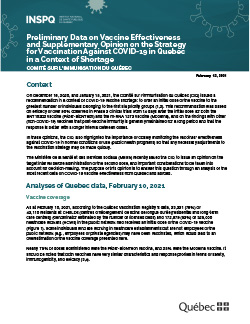Preliminary Data on Vaccine Effectiveness and Supplementary Opinion on the Strategy for Vaccination Against COVID-19 in Quebec in a Context of Shortage
The Ministère de la Santé et des Services sociaux (MSSS) recently asked the CIQ to issue an opinion on the target interval before administration of the second dose, and important considerations to be taken into account for decision-making. The purpose of this opinion is to answer this question through an analysis of the most recent data on COVID-19 vaccine effectiveness from Quebec and abroad.
Summary
The data available on the efficacy of mRNA vaccines against COVID-19 in Phase 3 studies (clinical studies) and their effectiveness in studies monitoring the rollout (public health programs) remain limited at present time. It is, however, possible to identify certain preliminary trends:
- The VE of a single dose of mRNA vaccines against COVID-19 appears high in the short term. It is likely that field effectiveness would be lower than the efficacy demonstrated in Phase 3 studies (92 %), one reason being that clinical trial participants are younger and in better health than the general population.
- The VE appears high among both older people (e.g., aged 80 and above) and younger people (e.g., healthcare workers). From the data currently available, it is not possible to determine if effectiveness is significantly lower among particularly frail seniors, especially those residing in CHSLDs.
- The VE for preventing illness seems to appear in 14 days among younger people and 21 days among older people. Maximum effectiveness might not be reached within 21 days among younger people or within 28 days among older people. It is plausible that the effectiveness for preventing serious infections, including those leading to hospitalization or death, begins sooner, but the data are not yet available for these outcomes.
- It is too early to determine at what point there would be a decrease in the effectiveness of a single dose as the maximum monitoring period of vaccinated individuals is less than two months. The studies are still underway and the data are analyzed on a weekly basis.
- From the data available on mRNA vaccines, it is not currently possible to determine the degree of additional protection from the second dose and the ideal interval between both doses of the vaccines to maximize long-term protection.
Recommendations
In view of the information presented here, the Comité sur l’immunisation du Québec recommends maintaining the proposed strategy for a context in which there is a COVID-19 vaccine shortage and high circulation of the virus, which is to provide an initial dose of the vaccine to the greatest possible number of individuals belonging to the first six priority groups. The CIQ reiterates that the second dose is important and must be made available, but it is currently difficult to determine the optimal time at which it should be administered. The CIQ also reiterates the importance of monitoring, in near-real time, the effectiveness of COVID-19 vaccines in Quebec for different age groups, and closely monitoring international data on this issue, which will help determine the right time for the second dose of the vaccine. A shorter interval before the second dose could be recommended if effectiveness is observed to be significantly lower than anticipated or if a decline in protection over time is observed. As there is no such evidence at present, a longer interval should be prioritized over a shorter one in a context of vaccine shortage to maximize the protection of the most possible people.
The CIQ recommends to clearly inform vaccinated individuals about the 14–28 day interval, depending on their age group, necessary to reach optimal protection against the illness. Considering this interval and the fact that VE remains imperfect, it is essential for vaccinated individuals to avoid behaviours that increase their risk of infection after they are vaccinated.
The CIQ recommends continuing efforts (e.g., access to vaccination, good communication, information capsules) to increase the proportion of healthcare workers who receive an initial dose of the vaccine. Higher vaccine coverage allows healthcare workers to reduce their risk of developing the illness, protect the integrity of the healthcare system, and potentially reduce the risk of introducing SARS-CoV-2 to environments like CHSLDs, private seniors’ residences, and hospital centres, or spreading it in these settings.


